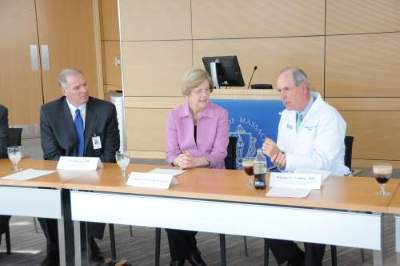Senator Warren visits UMass Chan, advocates for NIH funding

U.S. Sen. Elizabeth Warren met with Chancellor Michael Collins, UMass Memorial Health Care President and CEO Eric Dickson, UMass Chan faculty, students and several local officials on Friday, March 7, 2014 to tour the world-class research laboratories on campus and discuss the importance of federal research funding.
“I’m very glad to be here today, to hear more about the incredible, cutting-edge work that is done here; the amazing research, the work that is going to make a real difference for people across the Commonwealth of Massachusetts, across this country and around the world,” Sen. Warren said, after touring the lab of Associate Professor Chris Sassetti, PhD, at the Albert Sherman Center. “But we’ve got to have adequate funding and that’s a big part of what this meeting is about.”
Chancellor Collins said consistent support from the National Institutes of Health is vital to the future of medical research. Federal research dollars have been decreasing for years, and dropped significantly last year when the budget sequestration took effect.
“We have outstanding research and we are making a difference, not only locally in the care we provide our communities, but we are making discoveries that are impacting health care across the globe,” Collins said. “To the extent that Congress has a values construct and recognizes that these kind of commitments to health care can make a difference in the lives of the people of our nation, it would seem to me and to our academic community that this is something well worth funding.”
Investment in medical research by the National Institutes of Health (NIH) has yielded tremendous improvements in the nation’s health. Individuals impacted by serious conditions such as cancer, stroke, heart disease, diabetes and HIV have longer life expectancies today than ever before due to advances resulting from NIH funded research. From these relatively common ailments, to rare conditions that impact fewer people but in an equally devastating manner, NIH research has a long and proven track record of yielding treatments and therapies that dramatically improve health, quality of life, and life expectancy.
In recent remarks at a Boston Chamber of Commerce event, Senator Elizabeth Warren called on Congress to double funding for the National Institutes of Health (NIH) and stressed the importance of supporting innovation and basic scientific research. "What drives the Massachusetts economy - and the American economy - is innovation," said Senator Warren. "Innovation makes us soar. And government-supported research is a critical first step in generating that innovation."
"When it comes to the economy and the budget, refusing to invest in the NIH is the budgetary equivalent of cutting off your feet to save money on shoes," said Senator Warren. Studies have shown that increasing public investment in basic biomedical research directly increases the number of new drugs on the market. "I am reaching out to my colleagues on both sides of the aisle to build support for a renewed commitment to innovation. We need two things: to double our investment in scientific and biomedical research -- and to create more year-to-year certainty for that funding.
"I know some will say that we cannot afford to double our investments in medical research. They are wrong. Research creates economic growth. It reduces health care costs. It creates a better life for our people. And yet, the success rate for NIH grants has dropped by nearly 50% over the last 10 years. That makes no sense. There is good work to be done, work to save lives and work to boost our economy. We cannot afford NOT to increase our investments in medical research."